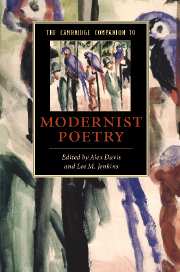Book contents
- Frontmatter
- Introduction
- Part I: Contexts
- Part II: Authors and Alliances
- 5 Pound or Eliot: whose era?
- 6 H.D. and revisionary myth-making
- 7 Yeats, Ireland and modernism
- 8 Modernist poetry in the British Isles
- 9 US modernism I: Moore, Stevens and the modernist lyric
- 10 US modernism II: the other tradition - Williams, Zukofsky and Olson
- 11 The poetry of the Harlem Renaissance
- 12 Caliban’s modernity: postcolonial poetry of Africa, South Asia and the Caribbean
- Part III: Receptions
- Guide to further reading
- Index
- Series List
7 - Yeats, Ireland and modernism
from Part II: - Authors and Alliances
Published online by Cambridge University Press: 28 November 2007
- Frontmatter
- Introduction
- Part I: Contexts
- Part II: Authors and Alliances
- 5 Pound or Eliot: whose era?
- 6 H.D. and revisionary myth-making
- 7 Yeats, Ireland and modernism
- 8 Modernist poetry in the British Isles
- 9 US modernism I: Moore, Stevens and the modernist lyric
- 10 US modernism II: the other tradition - Williams, Zukofsky and Olson
- 11 The poetry of the Harlem Renaissance
- 12 Caliban’s modernity: postcolonial poetry of Africa, South Asia and the Caribbean
- Part III: Receptions
- Guide to further reading
- Index
- Series List
Summary
In his introduction to The Oxford Book of Modern Verse, W. B. Yeats (1865- 1939) pronounced with careful qualification: 'I too have tried to be modern.' This statement, simultaneously tentative and emphatic, sums up the difficulties both of considering Yeats as a modernist tout court and of taking the measure of the undoubted modernism of his work from 1900 onwards. Not least of the factors seemingly setting him at a remove from this literary revolution is the fact that he was a member of an earlier generation than Ezra Pound (1885-1972) and T. S. Eliot (1888-1965), who were a couple of decades younger than him. Yeats, in fact, is at once inside and outside this movement. On one level, he may be viewed as an instigator and central practitioner of modernist poetry but, on another level, he is of note because he deviates from, or implicitly unsettles, any historiographical or conceptual map of modernism that we might want to adopt. Yeats, unlike Pound or Eliot, the poets with whom he is most closely connected in the early decades of the twentieth century, awkwardly occupies the roles of eminent precursor, revolutionary pioneer, sceptical antagonist and belated exponent of modernism. Multiplying such complications, in his later work, he appears in part to renege on some of the political radicalism of high modernism while never abandoning its creative potential and its anarchic promotion of change and social renewal. Paradoxically, Yeats is both a proleptic modernist and a late arrival in a movement that he helped to shape but never fully embraced.
- Type
- Chapter
- Information
- The Cambridge Companion to Modernist Poetry , pp. 126 - 146Publisher: Cambridge University PressPrint publication year: 2007

